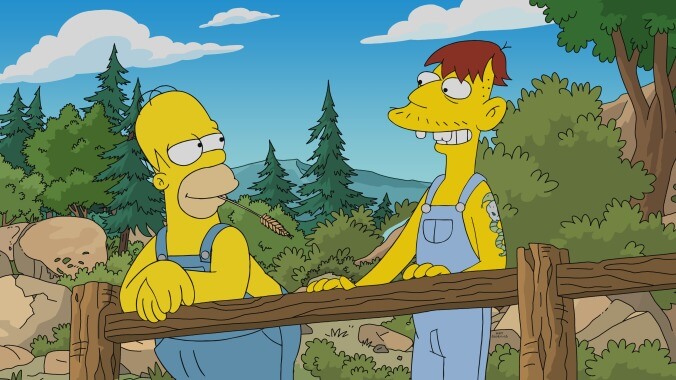Homer, Cletus, Marge, and Maggie all gasp for airtime in a breezy whiff of a Simpsons


“If this gets any cuter, I’m gonna bust.”
“The Unbearable Lightness Of Being A Baby” is sweet. Coming a few episodes after everyone in Springfield seemed to be taking jackass pills, that should be a good thing. And it isn’t bad, necessarily, in practice here. Maggie continues her big screen love story with the precociously cowlicked baby, Hudson. (Or at least their initial romance was supposed to play out on the big screen, in the before-times.) And Homer buddying up with an unlikely Springfielder and defying some old school Monty Burns villainous scheming is always a promising jumping-off point, too. Sure, the Homer-Cletus pairing here smacks of the writers room searching the memory banks for a C-lister that Homer hasn’t chummed around with too often, but, being two different kinds of slow thinkers, their grubby alliance makes some sense.
There’s nothing inherently wrong with anything in “The Unbearable Lightness Of Being A Baby,” but there’s nothing memorable about it, either. (The extreme sports couch gag notwithstanding. Letting different animators go to town on the mandatory episodic preamble has produced some truly memorable results in recent years, and, if this one isn’t equal to the best, its stylized depictions of the family at extreme play is pretty bracing.) I have to confess that personal preference plays into my indifference for the episode, as neither Cletus nor Maggie hold much interest for me as central characters. That said, I’m always willing to have the show change my mind, but their depictions here succumb to the expected pitfalls.
Maggie’s story sees her once more spying little Hudson at the upscale playground his vaguely annoying mother, Courtney, takes him to. And while Marge is initially pleased to set up a Playdate With Destiny playdate sequel for the tots, Courtney’s condescending helicopter parenting style sets up the plot obstacle that Marge simply can’t stand being in the chi-chi home of a woman who demands a full sexual history (“Only Homer,” Marge jots, defiantly) before she’ll let Hudson and Maggie hang out. Conflict set, although Courtney’s insufferableness could use a whole lot more shading. She’s obsessive about Maggie having her vaccinations, which Marge should be into. And sure, she’s sort of snotty about her luxurious house (where a Donkey Kong joke stands in for much of the satire), and tries to baby-proof Maggie’s hair-points (with marshmallows? foam blocks?), but Marge snaps Maggie up awfully fast, eventually even withholding the invitation to Hudson’s first birthday party.
A couple of things are working against this plotline. One—and here I feel like I’m copy-and-pasting as much as the writers—there is simply no reason to take two potential A-plots and have them choke each other out fighting for air on one episode. Marge’s dilemma (summed up when she makes the inevitable right choice as being “willing to pretend we like each other for our children”) is only going to miss being perfunctory if it’s given room to breathe. Sacrifice and parenting are themes so central to The Simpsons that an episode where Marge has to balance out her and her daughter’s happiness has all manner of possibilities. Instead, here we get a two-dimensional sketch of an antagonist and a second-act Marge-Homer summit in bed where they both explain their separate moral quandaries before splitting off once more.
And putting Maggie in the middle of the action ups the degree of difficulty, since, well, she’s a non-verbal baby. That has been explored feelingly here and there in the 30 years of Maggie Simpsons arrested infancy, but mainly she’s most effectively a plot pretext or a sight gag. And even that is preferable to those episodes where Maggie’s given hyper-intelligence for the sake of a gag, the sure sign of writers at a loss of how to use her. There’s a hint of the Maggie Simpson sweet spot in “The Unbearable Lightness Of Being A Baby” in her wordless helplessness as her mother whisks her around on whims Maggie can’t comprehend. But the plot turns on a scene where Marge makes a wordy explanation and apology for missing Hudson’s party, staged so that Marge and Maggie appear to be having it out (and Maggie appears to be angrily understanding everything Marge is saying.) It’s the comedy equivalent of cutesy dog reaction shots.
Over to Homer and Cletus, where, again, I’ll cop to needing my Cletus Spuckler (more fully, Cletus Delroy Montfort Bigglesworth Spuckler) in smaller bites than we get here. Cletus is one of those one-joke characters who stubbornly resists the leavening complexity doled out to other such supporting Springfielders, a walking, gap-toothed hick joke, complete with every incestuous, prodigiously breeding, jug-liquor swilling, gun-toting, ’possum-eating, grammatically unsound cliché heaped forever on his nonexistent, trout-like shoulders. Finding a deposit of valuable helium under the Spuckler family hovel, Cletus puts himself in Burns’ crosshairs, since the nuclear plant needs the increasingly rare gas for its cooling towers, and Mr. Burns never met an unlettered rube he couldn’t plot to take advantage of. Dragooning Homer into his plan to swipe Cletus’ gassy goldmine, Burns gets in a few classic, old-school Burns-isms (a can full of dimes is his final offer), but, as with Marge, Homer’s moral dilemma is never fleshed out enough to cast his eventual hero turn in serious doubt.
Basically, Homer doesn’t want to get punched by Burns’ goons, which isn’t close to enough motivation to counterbalance the camaraderie he finds with Cletus in their hasty montage of rural delights. (Catfish noodling goes awry in a way that Homer’s ancestors might have found familiar.) And as moderately amusing as it is to see the new pals continue their friendship through an revised version of “You’re My Best Friend,” the overlong musical interlude is tagged on at the end of an episode that could have used that time to make their actual relationship feel like more than a contrivance. (It’s less entertaining than it’s a kick in the pants when an episode that short-changes its dueling plots fritters away the ending on one of these dawdling afterthoughts.) Toss in the fact that the Cletus-Burns kerfuffle is resolved only when Cletus’ entire extended clan (Brandine and 29 kids—sorry, 31 kids, as Brandine announces from offscreen) whip out firearms to force Burns to pay up, and whatever human elements remain to this plotline float away like, well, you get it.
Stray observations
- I liked the visual gag where Homer is surprised at the skeletal Burns’ sudden appearance from behind his car antenna.
- On the other hand, if Burns and Homer are both going to have long, sepia-toned hallucinations from Cletus’ jug-hooch, they should be a lot more inventive.
- Oh, there’s the whiff of a third plot where the family is worried about Homer’s overeating and general terrifyingly bad health, but it’s just used to provide an excuse for Homer and Cletus to meet up. (Homer’s secret trunk-pizza grease causes him to crash his car at Cletus “balls what float” roadside stand.)
- Apart from the corporate synergy of spinning off “A Playdate With Destiny” into the show proper, I suspect the Disney influence in how it’s made clear that the very pregnant Brandine is drinking “non-alcoholic XXX” jug-hooch. If you’re going to do a Spuckler episode, you really can’t skimp on the Spuckler.
- You know, like the revelation that Cletus, in addition to his other yokel-esque shortcomings, apparently possesses two left hands.
- Note to Simpsons showrunner Al Jean: The grade is just a coincidence.